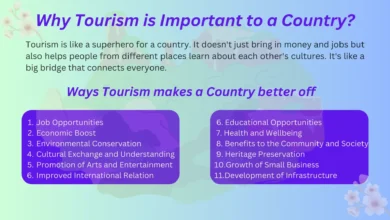
Economic Impact of Tourism
The economic impact of tourism on a country’s economy is huge as it contributes significantly to the growth of your country’s GDP. Tourism helps create jobs and brings in new investments from foreign businesses and individuals, which promotes economic growth. If your country’s tourism industry continues to grow as it has over the past several years, it will have an even bigger impact on your country’s economic growth in the future.
Economic Impact of Tourism
The economic impact of tourism triggers positive economic growth in many countries and states, including Tennessee. The Tennessee Department of Tourist Development has realized that it’s important to have a strong travel and tourism industry. In addition to travel-related employment, nearly $5 billion was added to state income in 2021. More than 1 million jobs are supported by travel and tourism in Tennessee.
The vast majority of tourists flock to Franklin, Nashville, Memphis, Pigeon Forge, and Gatlinburg—all cities with booming economies. When people visit these areas, they spend money at local businesses. This helps those businesses grow their own business and hire more employees. For example, you might go to a restaurant for dinner or buy gas for your car while visiting Tennessee.
Both activities directly benefit local workers who work at restaurants or gas stations throughout the state. It’s not just hospitality positions either; Tennesseans working in construction, real estate, and other fields all stand to gain from increased tourism activity. While more tourists mean a boost in overall employment rates, not everyone benefits equally from an increase in visitors.
If tourist spending outpaces population growth, some communities may feel an influx of new residents faster than others can absorb them into existing job markets. That could lead to housing shortages or increased competition for services like healthcare and schools.
Economic Impact of Tourism; The Economy
The economic impact of tourism is a major factor in the economic growth of many countries around the world. In fact, it is one of the largest sectors for employment in most developing countries with more than 200 million people employed throughout hundreds of thousands of businesses. Tourism industries also play a huge role in stimulating development and growth as they offer foreign exchange earnings, and investment capital and are often associated with significant improvements to transport and communications infrastructure (among other things).
Such factors make tourist destinations especially valuable for their contribution to national economic performance. For example, despite its small size, Jamaica’s tourism industry accounts for approximately 25% of its GDP. Similarly, over 20% of Thailand’s GDP comes from its tourism sector. These statistics alone highlight just how important tourism can be to an economy.
But there is another way that tourism can contribute to a nation’s prosperity: by increasing productivity within local economies. Although seemingly unrelated, research shows that there is actually a strong correlation between levels of productivity and levels of tourism expenditure within local economies – or put simply: if you want higher productivity, you need higher levels of tourists spending money!
Economic Impact of Tourism; The Effects
Tourism is a significant part of every economy, bringing about thousands and thousands of jobs for citizens in tourist-rich countries. Not only does it stimulate growth by offering opportunities for new employment, but it also promotes economic growth by encouraging international trade and increases in foreign exchange reserves. As travel industries have become more advanced and with new technology, new job positions have been created to accommodate tourists’ needs and requests.
From tour guides to hotel managers, there are hundreds of different occupations that can be found at any major tourist destination. In addition to these jobs being available for people looking for work, there are also many indirect or induced benefits that come from having an industry based around travelers and their money. The hotels and restaurants that cater to tourists create other jobs through their need for chefs, waiters, cleaners, security guards, and so forth. This means that even if you don’t get one of those coveted traveler jobs, you still might find yourself working indirectly because of them.
Positive Economic Impact of Tourism
Tourism has a positive effect on my country because it helps create jobs, increase trade, and improve foreign relations. When more people visit a certain location there are more job opportunities for local residents. For example, hotels and restaurants may require extra staff to accommodate tourists.
Additionally, restaurants may choose to purchase more kitchen appliances to better serve their customers as well as create more jobs in other fields such as farming produce that they use in their menu. With all these new positions available, many locals will be able to find work close by and not have to travel far away from home which can reduce transportation costs.
With increased spending at restaurants, grocery stores, gas stations, etc., many businesses will hire additional employees or expand their operations which also creates new jobs for those who want them. This means more money being spent within our own economy rather than having to import products from another country. This process allows us to build stronger relationships with our neighboring countries since we are trading goods with each other rather than importing everything we need. The government benefits when there is an increase in tourism since they receive tax revenue when companies make profits and pay taxes on their earnings.
Economic Impact of Tourism; Growth
The U.S. Bureau of Economic Analysis reports that international visitors spent $186 billion in 2020. This accounted for about 3% of America’s GDP, making it one of our fastest-growing sectors. Travel and hospitality jobs are expected to grow 2% per year through 2024, which outpaces overall employment growth by more than 10%. These jobs are spread across every state and district in America.
And when you factor in indirect spending—the money tourists spend at local businesses before, during, and after their trip—tourism’s total contribution to American GDP jumps up to 4%, according to Brand USA. For a deeper dive into these numbers, check out Brand USA’s report Economic Impact of International Visitors: A National Profile.
Economic Impact of Tourism; The Cons
Tourism can have a negative impact. Often, foreign visitors do not follow local laws and cultural norms, which can lead to increased crime and health risks for residents. And in certain industries, such as agriculture, an influx of tourists may cause short-term issues such as overcrowding and scarcity that leads to higher prices.
However, countries with more lenient immigration policies may benefit from foreign workers who choose to settle down. Moreover, many people travel to other countries for professional or educational opportunities that later benefit their home economy.
A study by Oxford Economics showed that every $1 spent by international travelers generated $1.13 in output within the host economy—meaning that if you spend $100 while traveling abroad, it will boost your own nation’s GDP by $113. This means that while tourism has some downsides, it also provides long-term benefits for both travelers and residents alike.
Economic Impact of Tourism; Advantages
Tourism brings a huge economic benefit to every nation in which it operates. Tourism allows more people to experience and enjoy a particular location. For instance, an individual might have a special love for Venice and may not be able to take time off from work to travel there often; however, if they live close enough or visit often enough, they can spend all of their spare time enjoying what makes Venice so special. In turn, businesses are able to cater to tourists’ needs, making them better prepared to provide goods and services that locals also use. This means that local residents are also benefiting from tourism indirectly.
The main advantage of tourism is that it helps boost revenue. The majority of revenue generated by tourists comes from purchasing items like souvenirs and food at restaurants within the area visited by tourists. A lot of money is also made through local businesses, as well as government-run locations such as museums, parks, and historical sites.




